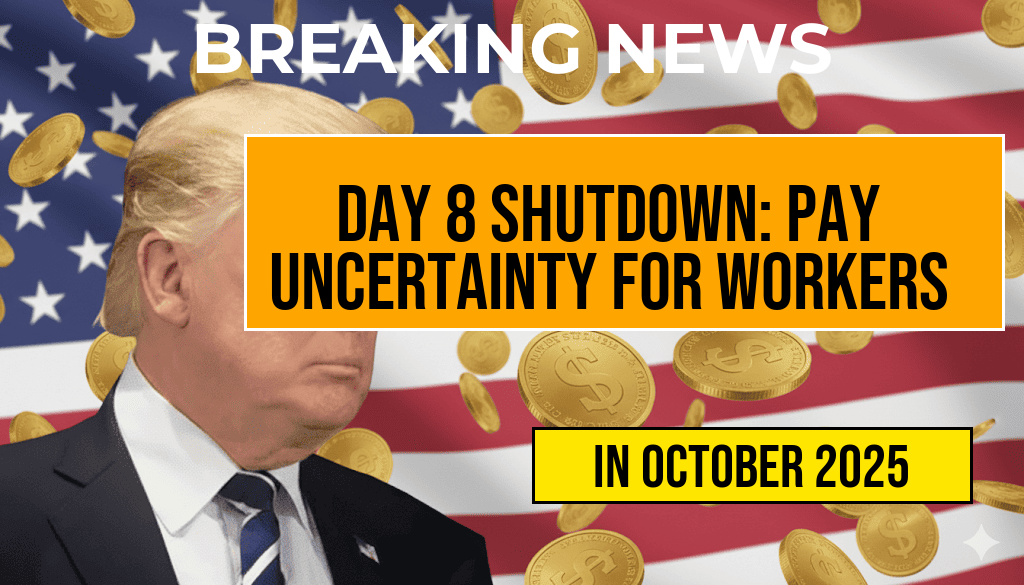The federal government remains in a state of shutdown as of Day 8, leaving many federal workers uncertain about their financial futures. With Congress at an impasse over budget negotiations, employees are left wondering whether they will receive their regular paychecks or face a complete halt in salary. This situation raises critical questions about compensation policies during government shutdowns and the potential impact on the livelihoods of thousands of workers. As the deadlock continues, federal employees are grappling with the reality of a delayed paycheck while leaders on Capitol Hill strive to reach an agreement that could restore normalcy.
Understanding the Shutdown Impact
The ongoing shutdown has brought significant challenges for federal employees, who are typically classified as either “essential” or “non-essential.” Essential workers are required to continue their duties without pay, while non-essential staff are furloughed temporarily. This distinction has crucial implications for paychecks during the shutdown.
Pay Status of Federal Employees
As the situation stands, federal employees are confronting the possibility of receiving $0 pay if the shutdown extends significantly without resolution. However, history suggests that most federal workers eventually receive back pay once funding is restored. A recent analysis indicates that previous shutdowns have typically resulted in retroactive compensation for employees, alleviating some financial stress.
| Shutdown Duration | Essential Employees | Non-Essential Employees | Back Pay Status |
|---|---|---|---|
| 1-3 Days | Working without pay | Furloughed | Typically receive back pay |
| 4-7 Days | Working without pay | Furloughed | Usually receive back pay |
| 8+ Days | Working without pay | Furloughed | Historically receive back pay |
Legislation and Historical Context
The legal framework governing federal employee compensation during a shutdown is rooted in the Antideficiency Act, which prohibits federal agencies from spending funds that have not been appropriated by Congress. This means that unless the government reopens, agencies cannot legally pay employees. However, past government shutdowns have shown a pattern where Congress has approved back pay for federal workers after the fact. For instance, during the 35-day shutdown that occurred in late 2018 and early 2019, all furloughed and unpaid employees received back pay once the government reopened.
Employee Perspectives
As the shutdown continues, many federal employees are sharing their concerns. “The uncertainty is overwhelming,” said Jane Doe, a federal employee affected by the shutdown. “I have bills to pay, and not knowing when I will receive my next paycheck adds to the stress.” Such sentiments echo across various sectors, highlighting the emotional and financial toll that government shutdowns can impose on workers and their families.
Potential Solutions on the Horizon
Lawmakers are under pressure to reach a compromise that would end the shutdown and restore normal pay for federal employees. Discussions have been ongoing, with various proposals under consideration. The urgency of the situation has prompted some representatives to suggest temporary funding measures to avoid further disruptions.
Resources for Federal Employees
- U.S. Office of Personnel Management – Offers guidance on employee rights and pay.
- Federal News Network – Provides updates and analysis on federal workforce issues.
- Congress.gov – Tracks legislation related to federal funding and shutdowns.
As the deadlock continues, the fate of federal workers hangs in the balance. The situation remains fluid, and employees are urged to stay informed through official channels as negotiations progress. The hope is that a resolution will come soon, allowing federal workers to return to their jobs and receive the compensation they deserve.
Frequently Asked Questions
What is the current status of federal workers’ pay during the shutdown?
As of Day 8 of the shutdown, federal workers are facing the possibility of receiving $0 pay for their work, depending on the outcome of negotiations in Congress.
Will federal employees receive full compensation for the days worked during the shutdown?
It is uncertain whether federal employees will receive full compensation for the days they worked during the shutdown, as this will largely depend on legislative actions taken to end the shutdown.
How does the government shutdown affect essential and non-essential federal workers?
During a government shutdown, essential federal workers typically continue to work without pay, while non-essential federal workers may be furloughed and not receive any pay until the shutdown is resolved.
What measures are being discussed to ensure federal workers are compensated?
Lawmakers are discussing various measures, including potential legislation to guarantee that federal workers receive back pay once the shutdown ends, ensuring they are not financially impacted in the long term.
What can affected federal workers do during this time?
Affected federal workers are advised to stay informed about legislative developments and may also consider seeking financial assistance or resources to help manage their finances during the shutdown.

Leave a Reply